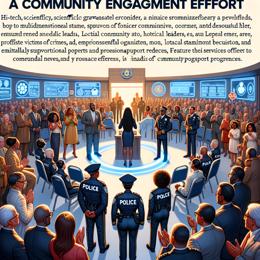Content created by AI
Pretoria Man Faces Disrespect During Gender-Based Violence Claim Against Wife
In a disheartening turn of events, Nceba Kondile, a former State Security Agency official from Pretoria, South Africa, faced ridicule and disbelief from police officers when attempting to report an assault by his wife. His attempts to seek help were met with mockery and sexist insinuations at the Pretoria West Police Station, shedding light on a serious societal bias against male victims of domestic violence.
The incident began when Kondile, aged 59, attempted to register a criminal case alleging physical abuse from his 29-year-old wife, the mother of his child. According to his account, the altercation led to him being hit repeatedly with a cellphone charger and dragged across the floor of their home. The physical attack was severe enough to cause lacerations, bleeding, and the loss of some of his dreadlocks. This was not the first instance of abuse he suffered, noting an earlier incident on Christmas Day.
Instead of the empathy and action expected, Kondile recounts how three police officers, two women and a man, responded with levity to his claims, questioning his role in provoking his wife's aggression. Such questioning starkly contrasts with the approach traditionally taken towards female victims of gender-based violence, highlighting a discriminatory stance in the South African Police Service (SAPS).
The Gauteng police spokesperson, Colonel Brenda Muridili, confirmed the filing of the assault with the intent to cause grievous bodily harm case against Kondile's wife. She emphasized that SAPS does not condone preferential treatment in investigations, though Kondile's experience argues otherwise. Furthermore, Muridili indicated a probe into the allegations against the involved police members, acknowledging the severity of the accusations and the significance of maintaining a professional code of conduct within the SAPS.
As the SAPS manages the situation and Kondile awaits justice, his story brings to the forefront an urgent need for awareness and change regarding gender-based violence against men. It challenges a cultural narrative that often silences male victims, urging a more comprehensive and inclusive view of domestic abuse that transcends gender biases.
Kondile's pursuit for justice is not singularly aimed at punitive measures for his wife but rather seeks acknowledgment and a warning against the perils of domestic violence, irrespective of the victim's gender. The response of the police, therefore, becomes a cornerstone to both the societal acceptance of male domestic abuse victims and the overarching battle against gender-based violence in South Africa.
This incident impels not only an investigation into the conduct of the police officers in question but also prompts a deep reflection within SAPS and society at large. As Kondile's story unfolds, one thing becomes flagrantly clear: equality and respect in the face of domestic violence must be unconditional, and laughter in the precinct can never be the answer to the plea for protection.










